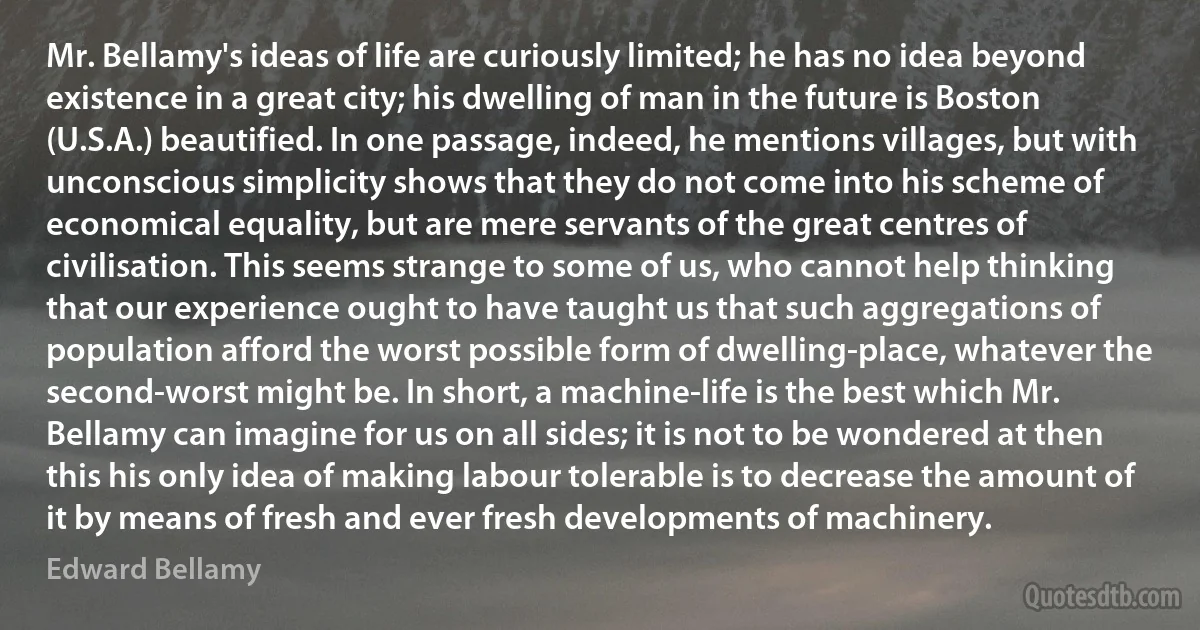
Mr. Bellamy's ideas of life are curiously limited; he has no idea beyond existence in a great city; his dwelling of man in the future is Boston (U.S.A.) beautified. In one passage, indeed, he mentions villages, but with unconscious simplicity shows that they do not come into his scheme of economical equality, but are mere servants of the great centres of civilisation. This seems strange to some of us, who cannot help thinking that our experience ought to have taught us that such aggregations of population afford the worst possible form of dwelling-place, whatever the second-worst might be. In short, a machine-life is the best which Mr. Bellamy can imagine for us on all sides; it is not to be wondered at then this his only idea of making labour tolerable is to decrease the amount of it by means of fresh and ever fresh developments of machinery.
Edward BellamyRelated topics
best beyond boston city experience form fresh future great help idea life limited machinery making man might mere ought passage possible short strange teach thinking unconscious whatever worst means civilisation labour dwelling-placeRelated quotes
The most immediate result of this unbalanced specialisation has been that to-day, when there are more "scientists" than ever, there are much less "cultured" men than, for example, about 1750. And the worst is that with these turnspits of science not even the real progress of science itself is assured. For science needs from time to time, as a necessary regulator of its own advance, a labour of reconstitution, and, as I have said, this demands an effort towards unification, which grows more and more difficult, involving, as it does, ever-vaster regions of the world of knowledge. Newton was able to found his system of physics without knowing much philosophy, but Einstein needed to saturate himself with Kant and Mach before he could reach his own keen synthesis. Kant and Mach - the names are mere symbols of the enormous mass of philosophic and psychological thought which has influenced Einstein.

José Ortega y Gasset
So we get to the fountain, my brother and I, and we look around, there wasn't a lot of people there and I said to my brother, "You go first." He tasted the white water and then we looked around and says, "Your turn." We tasted - I taste the white water. Then we both taste the colored water, and we looked at each other, six and seven years old. The water tastes the same! What's the big deal? We had not been taught segregation at the age of six and seven. We wondered what the big deal was about.
Now, that being said and growing in the segregated South, I am not mad at America. I don't have a grudge against America, because one of the things that has made this nation great in the short 235-year history, Sean, is its ability to change. A lot of other countries don't have that ability. We ought to be appreciative of the fact that this country has that kind of resilience.

Herman Cain
It is impossible to answer your question briefly; and I am not sure that I could do so, even if I wrote at some length. But I may say that the impossibility of conceiving that this grand and wondrous universe, with our conscious selves, arose through chance, seems to me the chief argument for the existence of God; but whether this is an argument of real value, I have never been able to decide. I am aware that if we admit a first cause, the mind still craves to know whence it came, and how it arose. Nor can I overlook the difficulty from the immense amount of suffering through the world. I am, also, induced to defer to a certain extent to the judgment of the many able men who have fully believed in God; but here again I see how poor an argument this is. The safest conclusion seems to me that the whole subject is beyond the scope of man's intellect; but man can do his duty.

Charles Darwin
To consider the city as the projection of society on space is both an indispensible starting point and too elementary an approach. For, although one must go beyond the empiricism of geographical description, one runs the very great risk of imagining space as a white page on which the actions of groups and institutions are inscribed, without encountering any other obstacle than the trace of past generations. This is tantamount to conceiving of nature as entirely fashioned by culture, whereas the whole social problematic is born by the indissoluble union of these two terms, through the dialectical process by which a particular biological species (particularly because divided into classes) "man", transforms himself and transforms his struggle for life and for the appropriation of the product of his labour.

Manuel Castells
Spontaneous social action will be broken up over and over again by State intervention; no new seed will be able to fructify. Society will have to live for the State, man for the governmental machine. And as, after all, it is only a machine whose existence and maintenance depend on the vital supports around it, the State, after sucking out the very marrow of society, will be left bloodless, a skeleton, dead with that rusty death of machinery, more gruesome than the death of a living organism. Such was the lamentable fate of ancient civilisation. ... Already in the times of the Antonines (IInd Century), the State overbears society with its anti-vital supremacy. Society begins to be enslaved, to be unable to live except in the service of the State. The whole of life is bureaucratised. What results? The bureaucratisation of life brings about its absolute decay in all orders.

José Ortega y Gasset
